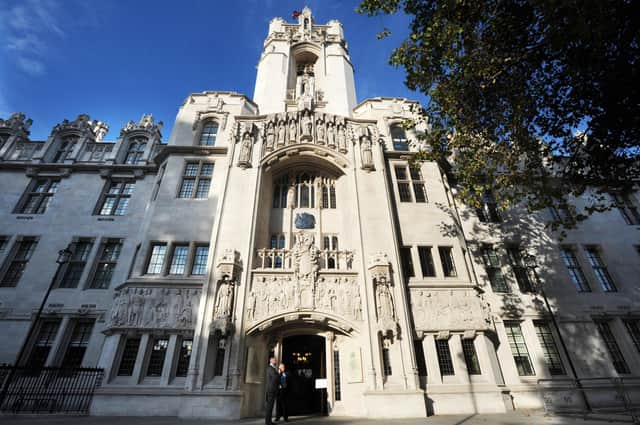Barrister: The Supreme Court ruling on the hooded men ruling might be beginning of end to legacy lawfare in Northern Ireland


Forty years later, McKerr is known for two lines of court cases: nine in the European Court of Human Rights at Strasbourg; and five in the UK’s Supreme Court.
From 2001, even the dogs in the street knew, regarding so-called legacy cases in Northern Ireland, that Strasbourg considered that historic Troubles investigations did not comply with Article Two of the European convention on human rights.
This article reads:


Advertisement
Hide AdAdvertisement
Hide AdEveryone’s right to life shall be protected by law. No one shall be deprived of his life intentionally save in the execution of a sentence of a court following his conviction of a crime for which this penalty is provided by law.
Then, last month (on December 15), in a Northern Ireland case known as McQuillan, a seven-judge Supreme Court in London revived the domestic McKerr line of cases from 2004.
There could be no question of finding that investigations into killings that happened before October 2 2000 had not complied with Article Two.
This is when the Human Rights Act (‘HRA’) 1998 was brought into force.
Advertisement
Hide AdAdvertisement
Hide AdThough few people, if any, appreciated it at the time, it is my view that on December 15 2021 we had the beginning of the end in Northern Ireland of legacy litigation.
Lord Hodge, the deputy president of the Supreme Court, argued in that recent judgement: “The general presumption is that a statute which creates rights and obligations does not have retrospective effect. This reflects values of fairness, legal certainty and the rule of law.
“It is desirable that people, including public officials and public authorities, should be able to determine their legal rights and obligations at the time of acting or omitting to act.
“It is generally unfair to treat people as subject to obligations of which they were not on notice at the time.”
Advertisement
Hide AdAdvertisement
Hide AdThe Supreme Court, however, did not clarify what should happen in a number of cases that had come before the Strasbourg court.
So it remains whether:
• an applicant in the UK could continue to access the European convention through the common law; or the HRA was the only way to plead article Two non-compliance? Thus, the Supreme Court relied upon two particularly controversial Strasbourg decisions: Silih’s case (against Slovenia) from 2009; and Janowiec’s case (against Russia) from 2013.
These allowed the Strasbourg court to consider legacy cases outside the normal legal rules on – what lawyers call – the temporal scope of the convention (namely, the times to which the convention applies.
The legal case Janowiec related to the Katyn forest massacre of Polish officers in 1940, yet Russia only became a party to the European convention in 1998!
Advertisement
Hide AdAdvertisement
Hide AdThat said, in the recent Supreme Court case relating to Northern Ireland, McQuillan, the three original applicants lost in their actions against various NI authorities on the facts.
The three applicants were:
• Margaret McQuillan, regarding her sister, Jean Smyth, killed in 1972 (the army being later suspected);
• and Francis McGuigan and Mary McKenna, regarding the 14 hooded men case in 1971, and the five military interrogation techniques used by the police on selected detainees.
You would not have known that these three applicants had lost from some of the media reports, which presented the Supreme Court ruling as yet another victory for the people against the UK state.
Advertisement
Hide AdAdvertisement
Hide AdThe relatives may be excused in not understanding the complicated judgement, but such generosity should not be extended their lawyers.
Let me explain why this is so.
In 1978, in Ireland v United Kingdom, the Strasbourg court had held that the hooded men had been subjected to inhuman and degrading treatment.
Following a RTE documentary in 2014, the Irish government – claiming it was torture – tried to reopen the case.
Strasbourg refused in 2018, as might have been foreseen, given that there is a principle of legal finality in all justice systems — in other words, cases come to an end and are not readily reopened decades later.
Advertisement
Hide AdAdvertisement
Hide AdLast month, the Supreme Court told Margaret McQuillan that: 1972 was much too early, even pushing back ten or twelve years from 2000. There was no violation of Article Two by the Northern Ireland authorities.
And the court told Francis McGuigan and Mary McKenna that: the RTE documentary evidence had been considered fully by Strasbourg in 2018. The Supreme Court supported Strasbourg against the Irish state in this respect.
It was not only the media the misinterpreted this ruling as another victory against the UK state.
The Irish taoiseach, Micheál Martin, with legal advisors available, even claimed that the Supreme Court had said that the hooded men had been tortured.
Advertisement
Hide AdAdvertisement
Hide AdTrue, the justices did quash as irrational a 2014 PSNI decision not to investigate the hooded men allegations. But the Supreme Court did not go on to require a proper investigation.
Indeed, the PSNI, breathing free for the first time in 20 years, issued a stunning press release: “The Police Service welcome the clear legal ruling that there are no legal obligations arising from Article 2 ECHR to investigate these cases. We will now carefully consider the judgments and their impact on the legacy caseload.”
Significantly, the Supreme Court criticised the late Lord Kerr — the subject of a recent Northern Ireland celebratory volume — for his leading judgment in the Finucane case in 2019.
It then impliedly criticised crown counsel (Sir James Eadie QC): “We have reservations as to whether Lord Kerr was right to interpret Janowiec as he did. This court has not been invited to depart from its decision in Re Finucane but we note that the extension beyond ten years allowed in Re Finucane involved less than two more years.”
Advertisement
Hide AdAdvertisement
Hide AdLord Kerr, starting in his ruling with the date 2000, had driven back 10 years as apparently permitted by Strasbourg for Article Two cases, but had to add another two years in order to embrace the killing of Pat Finucane, which was in 1989.
One cannot underestimate the significance of McQuillan as a landmark case.
Lawfare – the continuation of war by such legal challenges like McQuillan – is on notice.
The selection of the date October 2 2000 was a quantum jurisprudential leap towards the (domestic) McKerr line of cases.
Advertisement
Hide AdAdvertisement
Hide AdThe fact that the Strasbourg McKerr line of cases clutter the 100-page judgment – and make it more difficult to understand – means only that there might have to be at least one more heave in the Supreme Court.
In England, that would not be necessary because the parties would accept that the game is over.
Northern Ireland, however, is different.
• Dr Austen Morgan is a barrister in London (at 33 Bedford Row) and Belfast. His next book is: New Federalist Papers: why the United Kingdom needs a written constitution
——— ———
A message from the Editor:
Thank you for reading this story on our website. While I have your attention, I also have an important request to make of you.
Advertisement
Hide AdAdvertisement
Hide AdWith the coronavirus lockdowns having had a major impact on many of our advertisers — and consequently the revenue we receive — we are more reliant than ever on you taking out a digital subscription.
Subscribe to newsletter.co.uk and enjoy unlimited access to the best Northern Ireland and UK news and information online and on our app. With a digital subscription, you can read more than 5 articles, see fewer ads, enjoy faster load times, and get access to exclusive newsletters and content.
Visit
now to sign up.
Our journalism costs money and we rely on advertising, print and digital revenues to help to support them. By supporting us, we are able to support you in providing trusted, fact-checked content for this website.
Ben Lowry, Editor